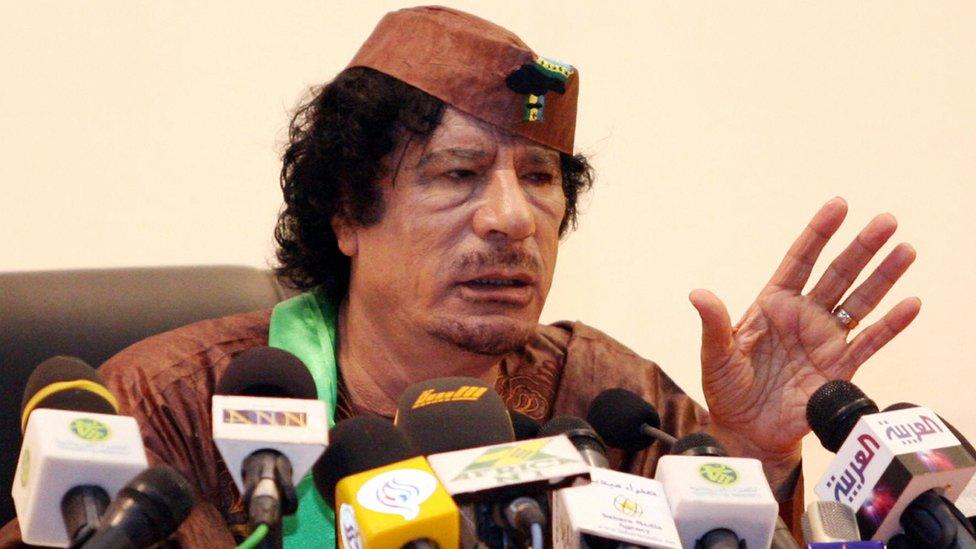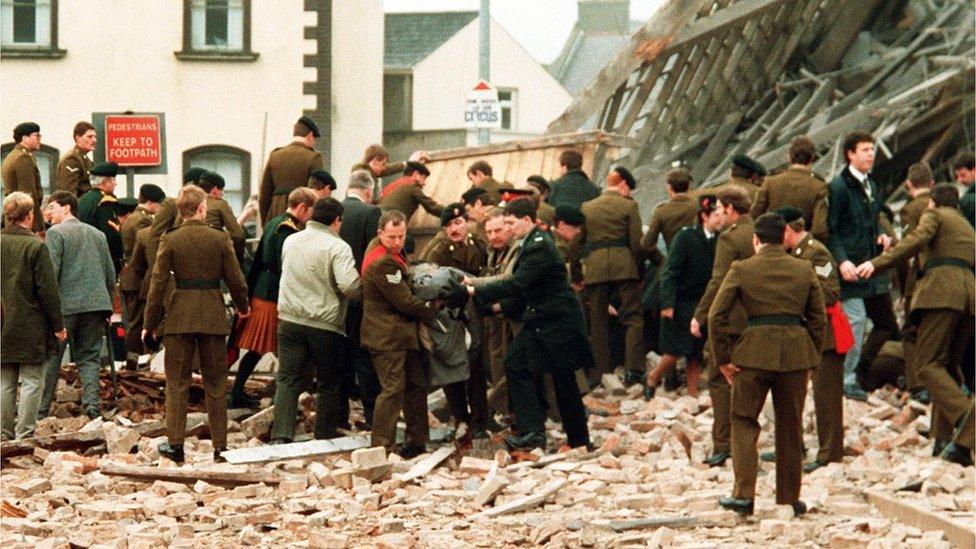Troubles compensation 'blocked by secret deal'
- Published

Muammar Gaddafi supplied weapons, including Semtex explosives, to the IRA during the Troubles
A victims' campaigner has claimed to MPs that a secret deal between the UK and Libya blocked a compensation package for IRA attacks during the Troubles.
Kenny Donaldson said he spoke to a senior Libyan bank official who is "vociferous" that the matter is closed.
He said he was told "a diplomatic outcome" was reached years ago.
It allegedly involved "a quid pro quo" between the supply of Semtex to the IRA and the UK's role in attacks on Libya.
Mr Donaldson "surmised" this may relate to the 1986 US air strikes on Libya, some of which were launched from the UK bases.
He told the Northern Ireland Affairs committee that the government needed to provide an explanation.
"There is a reason why compensation is not being pursued," he said.
MPs are looking at state-sponsored terrorism by the regime of the late dictator Colonel Muammar Gaddafi, who was the IRA's main arms supplier during the Troubles.
The government recently ruled out going after the north African country for damages.
'Smoke and mirrors'
Committee chairman Simon Hoare asked Mr Donaldson why, if there was a deal, the government later appointed a special advisor, William Shawcross, to look into the compensation issue.
Mr Donaldson replied: "Smoke and mirrors."

Libyan Semtex was used in the Remembrance Sunday bombing in Enniskillen
The committee was also told by another witness that the government had put trade links with Libya ahead of securing damages for victims.
Campaigner Jonathan Ganesh said: "Our government has disgraced victims. They fought for trade deals more than they fought for victims."
The United States, Germany and France has each obtained payments from Libya, external.
Multiple shipments from Colonel Gaddafi to the IRA included powerful Semtex explosives used in the likes of the Remembrance Day bombing in Enniskillen, County Fermanagh, in 1987.
As well as hearing from Mr Ganesh, who was injured in the London Docklands bomb in 1996, evidence was also given by a former policeman, Billy O'Flaherty.
He was badly wounded in an IRA bomb attack on his patrol car in Cushendall, County Antrim, in 1989.
"I don't think our government really want to rock the boat," he said.
"They hope to look at the clock until there are very few victims left to challenge them."
Phyllis Carrothers, whose husband, a policeman, was murdered in an IRA bombing in Fermanagh in 1991, said: "The government should be embarrassed by a failure to treat us properly.
"Our family feel it is the only justice left open to us."
'Unjustifiable'
DUP MP Gregory Campbell, a member of the committee, said the government had "behaved exceptionally badly".
He added: "The current position is untenable and unjustifiable and they need to hear that message."
Mr Ganesh replied: "As long as we can breathe we will do all we can to rectify this. If we don't, this will leave a stain."
Mr Shawcross's report on the compensation issue is being kept under wraps.
He recently told the committee he had "huge sympathy" for victims.
Last month the government said it was unable in law to use £12bn of Libyan assets frozen in the UK to make payments.
Campaigners said, however, freeing those assets should be conditional on a compensation package for bereaved families and victims.
The government is also using £5m a year in tax revenue from the assets for other things.
It has told victims to pursue Libya themselves and to apply for payments from the new Troubles pension scheme.
Related topics
- Published24 March 2021

- Published23 March 2021

- Published24 June 2019
